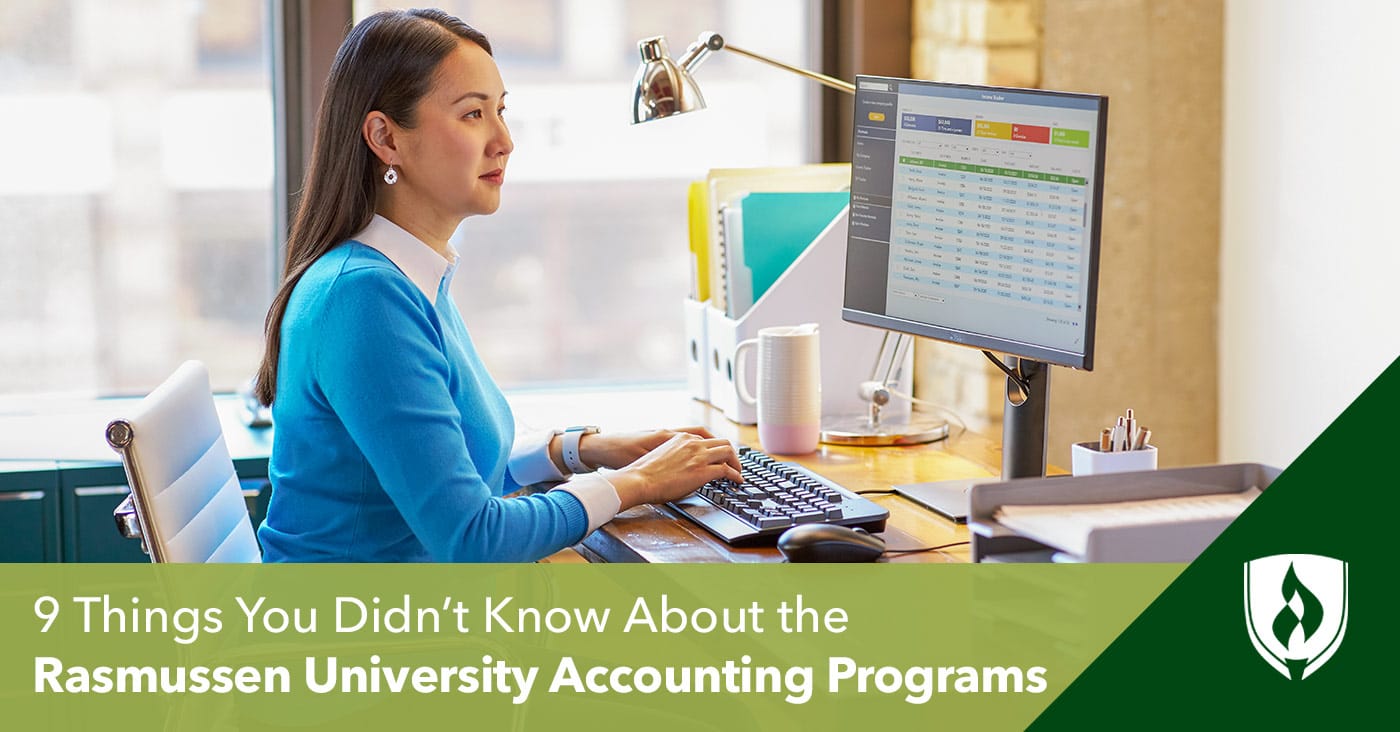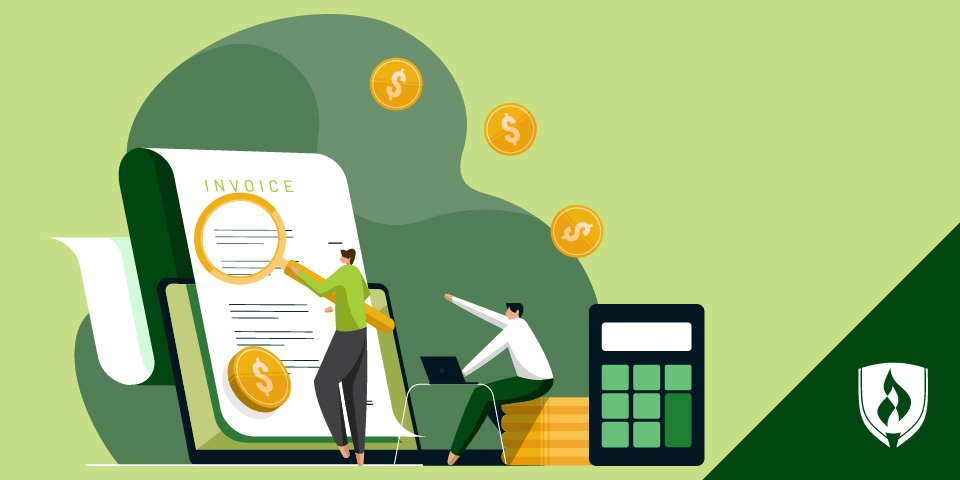9 Things You Didn't Know About the Rasmussen University Accounting Programs
By Will Erstad on 12/09/2019

You’ve always considered earning a business-related degree. As you’ve quietly weighed the pros and cons of your options, you keep finding yourself drawn toward the field of accounting. It might not be the flashiest field, but an Accounting degree can provide a rock-solid foundation for building a stable career.
Choosing the degree you intend to pursue is a great start, but then comes the challenge of finding the program that works for your needs. What can you expect from your instructors? Will you be able to fit this program into your schedule? What will you actually learn in your Accounting courses?
If you’re considering the Rasmussen University Accounting program, we’ve got the answers to many of your questions. Get a closer look at the ins and outs of the program to find out if it’s the one you’ve been looking for.
What to know about the Rasmussen University Accounting programs
The Rasmussen University Accounting program was designed for busy students who are determined to master the practical skills today’s accounting workforce needs. Learn about some of the ways the program stands out.
1. Rasmussen University has educated Business students for over 100 years
You might not know it, but the origin of Rasmussen University can be traced all the way back to 1900 when Walter Rasmussen opened the Rasmussen Practical School of Business in Stillwater, Minnesota. A lot has changed in the 100 plus years since then. For one, the University has grown tremendously, expanding into new locations and academic offerings to meet the demands of employers and students in our modern economy.
Despite these changes over the years, the fundamentals of educating accounting and other business professionals remain the same. Today, the University has paired their long-standing expertise in business education with over 15 years of providing quality online education to create an effective option for flexible learning. With tens of thousands of graduates in their alumni ranks, Rasmussen University has walked the walk and knows how to equip students for future success in their business careers.
2. Students learn from experienced accounting professionals
If you’re learning the finer points of a complex subject, who better to teach you than someone who has applied these lessons in their professional life? Rasmussen University Accounting instructors draw on the wealth of their collective experience to provide context and drive home why the subject you’re learning is important in the real world.
Roxanne Visser, Assistant Professor at Rasmussen University, says she draws on the experiences she had as a new accountant to help students work through challenges they’re facing with coursework.
“I share stories of these experiences and students find great value in understanding that sometimes it’s the struggle that we learn the most from,” Visser says.
These personal experiences and anecdotes can provide a lift by allowing the material to be viewed through a practical lens. Assistant Professor Margaret Stenzel says she likes to refer to recent events and case studies to illustrate how a concept is applied.
“Drawing on current business news events and case studies helps make accounting concepts more real,” Stenzel says. “For example, earlier this year Kraft Heinz showed us how accounting for goodwill can affect the bottom line, and more recently, how estimating warranty expense impacted Tesla’s quarterly earnings.”
3. Graduates will be equipped with the skills employers are seeking
Whether you’re seeking entry-level bookkeeping and payroll-related roles at the Associate’s degree level or more advanced accounting and auditing positions at the Bachelor’s degree level, the Accounting curriculum at Rasmussen University is designed to equip students with the skills employers want most from job candidates.
Throughout these programs, students will develop a deep-rooted knowledge of financial accounting topics like asset valuation, balance sheets, accounts payable and receivable, financial statement analysis, tax law and corporate accounting. Along the way students will master important software tools like QuickBooks® and every accountant’s secret weapon—Microsoft Excel®.
4. The bachelor’s degree curriculum prepares grads for the Certified Management Accountant credential
Accounting is a field where professional certifications and credentials can be very important, which is why the curriculum for the Accounting Bachelor’s degree program was created to align with the globally-recognized Certified Management Accountant (CMA) credential offered by the Institute of Management Accountants.
“Certification of any type is a benefit to a new graduate as it shows prospective employers that they have specific areas of interest and proficiency and the drive to prove it,” Visser says. “Earning the CMA credential may offer more opportunities for graduates who want to work with a single company or organization and assist with making their strategic decisions.”
5. The Accounting programs provide ways for you to finish faster
Going to college is a significant investment. While there’s no way to just snap your fingers and be on your way with a degree and the know-how that comes with it, Rasmussen University does offer Accounting programs that can be completed fairly quickly.
For example, let’s say you’re starting with a clean slate with no prior college credits to potentially transfer in. In as few as 18 months, you can complete an Accounting Associate’s degree.1 You could stop there, or seamlessly transition into an Accounting Bachelor’s degree completion program that can be finished in as few as another 18 months.1
It doesn’t take an accounting student to understand that this path has the potential to be shorter than what you might find with a traditional 4 year program.
6. Empowered Learning® and self-directed assessment offerings put you in control
Rasmussen University knows not every student follows a straight path from high school to college and then a career—there are twists and turns along the way for many students. But those detours can also provide worthwhile practical experience that can prove valuable on your way to a degree.
So how can that benefit you as an Accounting student at Rasmussen University? One time- and money-saving option is to successfully complete self-directed assessments. These $149 online assessments allow students to tackle a subject independently (with no-cost support materials) and earn credit upon successful completion.
Another aspect you may find appealing is Rasmussen University’s Empowered Learning® approach to online education. These fully online competency-based education (CBE) courses provide additional flexibility in how they learn because the pace is under their control.
For example, you could opt to take an entire term’s worth of English Composition work in a short burst at the beginning of the quarter and free up that time for other work. As long as you complete all assignments and assessments by the end of the course term and stick to a simple 14-day attendance window, you can set the terms for when you’ll get things done.
7. Students learn to adhere to generally accepted accounting principles (GAAP)
Imagine if every business whose stock is traded on Wall Street had a slightly different way of determining revenue or expenses over a period of time. With so many investment decisions based upon financial reports, these differences would become a mess to sort out, verify and actually gather useful information from.
This is part of what makes the standard of generally accepted accounting principles (GAAP) so important. Enforced by the Securities and Exchange Commission, GAAP principles provide a set of standards and ground rules for publicly traded businesses with dealings in the United States.
Students in the Rasmussen University Accounting programs will learn, adhere to and apply these principles throughout their coursework. This provides them with practical, hands-on experience navigating the nuances of these important industry standards.
8. The program has a streamlined enrollment process
If you’ve never attended college, the steps you’ll need to take to get started can seem intimidating. With Rasmussen University, you’ll be in direct contact with admissions specialists who can help you along each step of the process. Whether you have questions about the paperwork that needs to be completed, transfer credit policies or other pressing issues, you can rest easy knowing you’ll have someone to support you through the process.
When you’re accepted and enrolled in Rasmussen University, you hit the ground running. You don’t spend time completing only general education courses while waiting for find out if you’ll gain entry into the Accounting program. Here, you’ll know that as soon as you’re in, you’re in, with no surprise roadblocks to advancing your education. Plus, with eight start dates offered each year, you won’t need to wait for months to get started on your education.
9. Rasmussen University students receive comprehensive support services
Going to college can be a little intimidating, particularly if you’ve never attended before. Where do you go if you have questions? What happens if you’re having technical difficulties in an online course? Can someone refresh your memory on how to format a research paper? There’s a lot of potential worries and what-ifs that could bog you down.
One thing you won’t have to worry about? The support you’ll receive at Rasmussen University. The University has a wealth of student support services with dedicated teams available to assist you with a host of issues including tech support, academic support tools, career planning, resume development and more.
Ready to get started in an Accounting program?
Choosing an Accounting program is a big step that will take some careful consideration. If you’re ready to take advantage of all Rasmussen University has to offer, request more information to get the process started and connect with an admissions advisor.
Microsoft Excel is a registered trademark of Microsoft, Inc.
QuickBooks is a registered trademark of Intuit, Inc.
1Completion time is dependent on number of transfer credits accepted and the number of courses completed each term.
This Accounting program does not meet all educational prerequisites for licensure as a Certified Public Accountant (CPA) in any state. For further information on professional licensing requirements, please contact the appropriate board or agency in your state of residence.
EDITOR'S NOTE: This article was originally published in 2014. It has since been updated to include information relevant to 2021.




